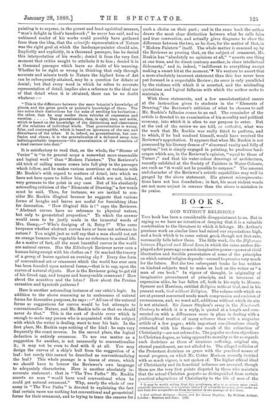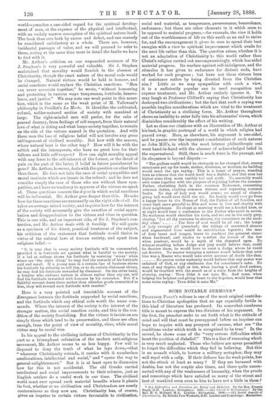BOOKS.
GOD WITHOUT RELIGION.t
THIS book has been a considerable disappointment to us. But in saying so we have no intention of denying that it is a valuable contribution to the literature to which it belongs. Mr. Arthur's previous work on similar lines had raised our expectations high, and a book which is to some extent good, though not first-rate, necessarily falls below them. The little work, On the Difference between Physical and Moral Law, in which the same author dis- played a few years ago so much imaginative power—power of vivid illustration and forcible presentation of some of the principles on which natural religion depends—seemed to promise very much for the future. But the two subsequent books he has written on kindred subjects tend to make us look on the writer as "a man of one book." In vigour of thought, in originality of imaginative presentment of principle, and in terseness of expression alike, he has fallen off, both in his reply to Messrs. Spencer and Harrison, entitled Religion without God, and in his present work, God without Religion. The volume with which we are at present concerned needs much compression and excision of excrescences, and, we must add, additions without which its aim is not attained. Sir James Stephen's essay in the Nineteenth Century to which it is a reply, is quoted at a length and com- mented on with a diffuseness more in place in dealing with a philosophical treatise of many volumes than with a magazine article of a few pages ; while important considerations closely connected with his theme—the result of the extinction of
Christianity—are not referred to. The popular modern objections to Christian dogma, as being opposed to morality so far as regards such doctrines as those of vicarious suffering, original sin, eternal punishment, are not alluded to. The alleged collision of the Protestant doctrines on grace with the practical means of moral progress, on which Mr. Cotter Morison recently insisted with so much vigour, is not spoken of. The higher ethical ideal of Christianity and its beneficial influence are assumed, though these are the very first points disputed by those who maintain
that the actual Christian gospel— as distinguished from certain practical adaptations of Christianity to the life of men of the • It may be worth noting that this gentleman, who is E o severe upon small. scientific inaccuracies, is so careless himself of scientific accuracy, as to make no less than five misquotations from his author in one passage of the lines.
God without Religion : Deism and Sir James Stephen. By William Arthur. London : Bemrose and Bons. 1887.
world—preaches a one-sided regard for the spiritual develop- ment of men, at the expense of the physical and intellectual, with an unduly narrow conception of the spiritual nature itself.
The book thus errs both by excess and defect, and can scarcely be considered satisfactory as a whole. There are, however, incidental passages of value, and we will proceed to refer to them, noting at the same time more in detail the faults we have to find with it.
Mr. Arthur's criticism on one unguarded sentence of Sir -J. Stephen's is very powerful and valuable. Sir J. Stephen maintained that morality would flourish in the absence of Christianity, though the exact nature of the moral code would be changed. Natural virtues would be held in honour, and social sanctions would replace the Christian sanctions. "Men can never associate together," he wrote, "without honouring
and protecting in various ways temperance, fortitude, benevo- lence, and justice." We may note one weak point in this asser- tion, which is the same as the weak point of M. Tallevant's philosophy in Feuillet's La Mork. It identifies the cultivated,
refined, nobler-natured section of society with mankind at large. The right-minded men will prefer, for the sake of general decency, from feelings of self-respect, from their natural love of what is fitting and what keeps society together, to remain on the side of the virtues named in the quotation. And with these men the loss of religious belief will not involve any gross infringement of civilised morality. But how with the masses, whose natural bent is the other way ? How will it be with the selfish and the intemperate, who have no great love for their fellows and little self-respect ? How can right morality appeal with any force to the self-interest of the former, or the dread of pain on the part of the latter, if belief in future punishment be
gone? Mr. Arthur, however, deals with the question on other lines than these. He does not take the case of social sympathies and
moral instincts which are innate in the refined ; and he does not consider simply the case of those who are without these sym- pathies, and have no tendency to approve of the virtues we speak
of. These questions concern the degree in which social sanctions will be influential. Mr. Arthur goes deeper than this. He asks how far these sanctions are necessarily on the right side at all. He takes an average mixed society, and inquires how far the interest of the society will necessarily give the sanction of social appro- bation and disapprobation to the virtues and vices in question.
This is one side, and an important side, of Sir J. Stephen's con- tention, and Mr. Arthur deals with it forcibly. We will quote
as a specimen of his direct, practical treatment of the subject, his criticism of the statement that fortitude would thrive in virtue of the natural laws of human society, and apart from religious belief :— " It is true that in every society fortitude will be commended, provided it is fortitude set against what is hateful to the society. If a lad at college shows his fortitude by resisting 'wines' when wines are the right thing,' he may find the rewards of his fortitude -cold and small. If a young man in a certain line of business shows his fortitade by refusing to tell lies, or to do certain dishonest things, he may find his fortitude rewarded by dismissal. On the other hand, a burglar who endures torture in silence rather than cry out, will find his fortitude rewarded with honours by his comrades. But if a faithful servant dares them rather than abandon goods committed to tam, they will reward such fortitude with murder."
Here is a very pointed and irresistible account of the -divergence between the fortitude supported by social sanctions, and the fortitude which any ethical code worth the name com- mands. Where the interest of the society is the interest of the stronger section, the social sanction exists, and this is the con- dition of the society flourishing. But the virtues it insists on are simply those which tend to its preservation, and these are often enough, from the point of view of morality, vices, while moral virtue may be social vice.
In his appeal to the civilising influence of Christianity in the past as a triumphant refutation of the modern anti-religious movement, Mr. Arthur seems to us less happy. Few will be disposed to deny the truth of what he lays down,—that "wherever Christianity extends, it carries with it numberless ameliorations, intellectual and social," and "opens the way to general enlightenment." But it is at least open to discussion how far this is not accidental. The old Greeks carried intellectual and social improvements to their colonies, just as English settlers do a useful work in our time. The civilised world must ever spread such material benefits where it plants its foot, whether or no civilisation and Christendom are nearly conterminous as they now are. Christianity has, of course, given an impetus to certain virtues favourable to civilisation, social and material, as temperance, perseverance, benevolence, endurance ; but there are other elements in it which seem to be opposed to material progress,—for example, the view it holds out of the worthlessness of life on this earth as an end to strive for, and the encouragement it gives to men to spend their best energies with a view to spiritual improvement which avails for the next life rather than this. The question arises, whether it is not an adaptation of Christianity to this world rather than Christ's religion carried out uncompromisingly, which has aided material progress. Its warfare against self-indulgence, and the stimulus it has given to endurance for distant ends, have worked for such progress ; but have not these virtues been of assistance rather by being diverted from the Christian aim ? Little as we may sympathise with such a view, it is a sufficiently popular one to need recognition and express treatment, and Mr. Arthur entirely ignores it. We may laugh at Professor Clifford's saying that Christianity has destroyed two civilisations ; but the fact that such a saying was possible implies considerations which are vital to the treatment of Christianity as a civilising force. Mr. Arthur throughout shows an inability to enter fully into his adversaries' views, which diminishes considerably the effect of his writing.
Let us close our citations with an illustration of Mr. Arthur at his best, in graphic portrayal of a world in which religion had. passed away. Here, as elsewhere, his argument is one-sided, and he passes over the important consideration of such natures as John Mill's, in which the most intense philanthropic zeal went hand-in-hand with the absence of acknowledged belief in the supernatural. Still, there is much force in the passage, and its eloquence is beyond dispute :—
"The godless world would be obviously so far changed that, among structures put up for trade, shelter, diversion, or warfare, no building would meet the eye saying : This is a house of prayer, standing here as witness that the world itself has a Builder, and that man has higher aims than mere earthly toil and strife. No assembly would ever come together with the purpose of rejoicing before the common Father, cherishing faith in the common Redeemer, reasserting common duties, exalting common virtues, and reproving common faults. No day of holy rest would come; no sound of church- going bell would ever thrill the air. No family would ever go from a happy home to the House of God, the Father of all families, and come back more grateful to Him and more in love and charity with their neighbours. No closet at morning would see a banded knee, or at night would hear a confession to the Father who seeth in secret. No workman would shoulder his tools, and set out in the early grey, singing, Let all thy converse be sincere, thy conscience as the noon- day clear.' The fires of zeal would be all out ; the lamps of holy example all quenched ; the tidings of converted sinners and regenerated lives would be antediluvian legends ; the man of fiery heart and tongue, brave to confront the greatest sinner when hardened, and tender to comfort the lowest of the low when penitent, would be a myth of the departed ages. No witness standing before Judge and jury would believe that, could he deceive them, he would have to meet a Judge whom he could not deceive. No master wronging a servant would believe that over him was a Master who would take strict account of deeds like that.
No person under authority would believe that any power was ordained of God, or any obedience due for conscience's sake. No man of any degree, high or low, when leaving a good deed undone, would be troubled with the sound as of a voice from the heights of eternity, saying : Thou didst it not unto Me. And none, when helping the helpless and giving heart to the hopeless, would hear that same voice saying : Thou didst it unto Me."



















































 Previous page
Previous page